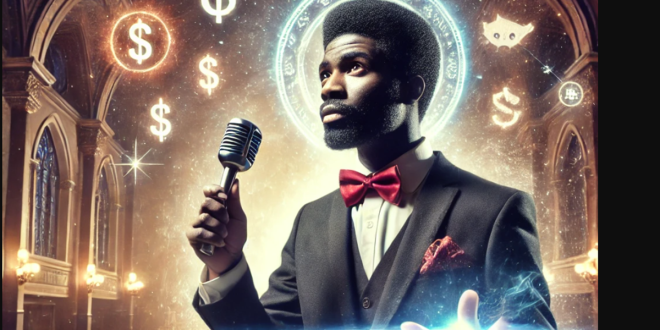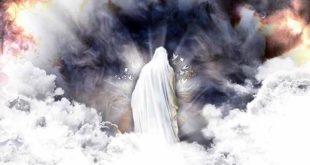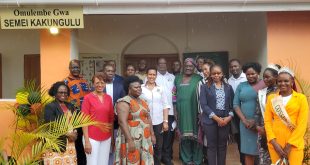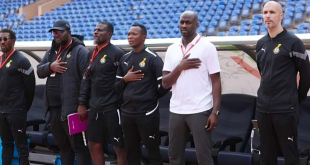Here’s a look at some of the most controversial cases in recent years involving Ghanaian pastors and their alleged “fake prophecies.”
Prophet Nigel Gaisie, the founder of the Prophetic Hill Chapel, is perhaps one of the most well-known prophets in Ghana, particularly for his predictions around political and celebrity events.
His prophecy that a woman would emerge as President of the United States in the 2024 elections was widely discussed. In his vision, he saw a woman, specifically naming “Harris,” leading the world, which many interpreted as Vice President Kamala Harris.
However, this prophecy did not come to pass, as former President Donald Trump won the election in a decisive victory. Following the results, social media was flooded with commentary, with some labelling him a “false prophet.”
While Gaisie admitted that sometimes prophets make mistakes, he stood by his claim and clarified that there was more to the prophecy than the public realised, further fuelling debate.
Speaking on Kumasi-based Abusua FM, he said: “Ghana is not stable at all. Don’t believe anyone who comes to tell you that Ghana is at peace.
“Last year God revealed to me that this year some big men in our society will die just like how we lost about six of them last year. In November and December 2016 God repeated the revelation.”
Bishop Obinim said the cause of the deaths was not revealed to him but said he and his junior pastors have been praying over the revelation.
3. Reverend Isaac Owusu Bempah
Reverend Isaac Owusu Bempah, founder of the Glorious Word Power Ministries International, is another prominent figure in Ghana known for his bold and often controversial predictions, particularly about Ghanaian politics.
Owusu Bempah’s spiritual poison prophecy about Mahama:
Directly prophesying to the NDC, he said, “In the vision, I saw some members of the NDC plotting against their leader, Mahama, they subsequently shot him with an arrow and all I could hear was that Mahama had died, this can be averted with prayer”.
In 2019, Bempah faced intense scrutiny when he prophesied the death of Chief Imam Sheikh Osman Nuhu Sharubutu, a highly respected Muslim leader in Ghana. This prophecy sparked outrage, with many accusing him of attempting to incite religious tension. Following the backlash, Bempah attempted to clarify that the prophecy was only a warning.
Evangelist Addai gained a reputation for his sensational and often unfounded claims about Ghanaian celebrities, politicians, and even pastors. Although he is not a traditional pastor with a congregation, his popularity on social media has allowed him to reach a large audience. Addai has made numerous “prophetic” statements about Ghanaian public figures, often suggesting that they are involved in secret societies or occult practices without any physical prove
Badu Kobi’s prophecy about Ghana not winning 2019 AFCON
During his 2018 31st Watch Night service, Prophet Emmanuel Badu Kobi prophesied that the Black Stars will not win the 2019 Africa Cup of Nations.
“The Black Stars would not win the Africa Cup of Nations this year. Last year I said on a TV interview that Ghana football would go down and I advised Kwesi Nyantakyi to step down but he didn’t mind me until Anas exposed him,” he said.
He also predicting that Brazil would win the Copa America and England the UEFA Euro Championship. Both predictions turned out to be false, resulting in widespread ridicule on social media.
6. Prophet Cosmos Walker Affran
Prophet Cosmos Walker Affran claimed that he had ordered demons, trees, fish, and birds to vote for Mahama to win the 2020 elections.
According to him, even if humans fail to vote for Mahama, the aforementioned creatures will vote for him.
Affran has also predicted death for Kennedy Agyapong after Ahmed Suale’s death when he said that “a tree from the North will sweep a white powder from Assin Central away”.
Public Response to “Fake Prophecies”
The controversies surrounding these prophecies have fuelled public discourse in Ghana. Some people argue that prophets are human and fallible, capable of misinterpreting divine messages.
Others insist that a true prophet’s predictions should come to pass, and they view repeated failed prophecies as a sign of deceit or self-promotion. The Ghanaian government has even considered regulating “doom prophecies” to prevent fearmongering and public unrest.
While many Ghanaians continue to hold faith in prophetic figures, there is a growing call for accountability among pastors who make public predictions. This shift is evident in the criticism directed at popular prophets, with some Ghanaian citizens demanding a more transparent approach to prophecy.
Source link
 The Impalaa Reports Impalaa is your biggest news source in Uganda and the East African region, bringing breaking news, daily updates, and the latest stories from Uganda.
The Impalaa Reports Impalaa is your biggest news source in Uganda and the East African region, bringing breaking news, daily updates, and the latest stories from Uganda.



